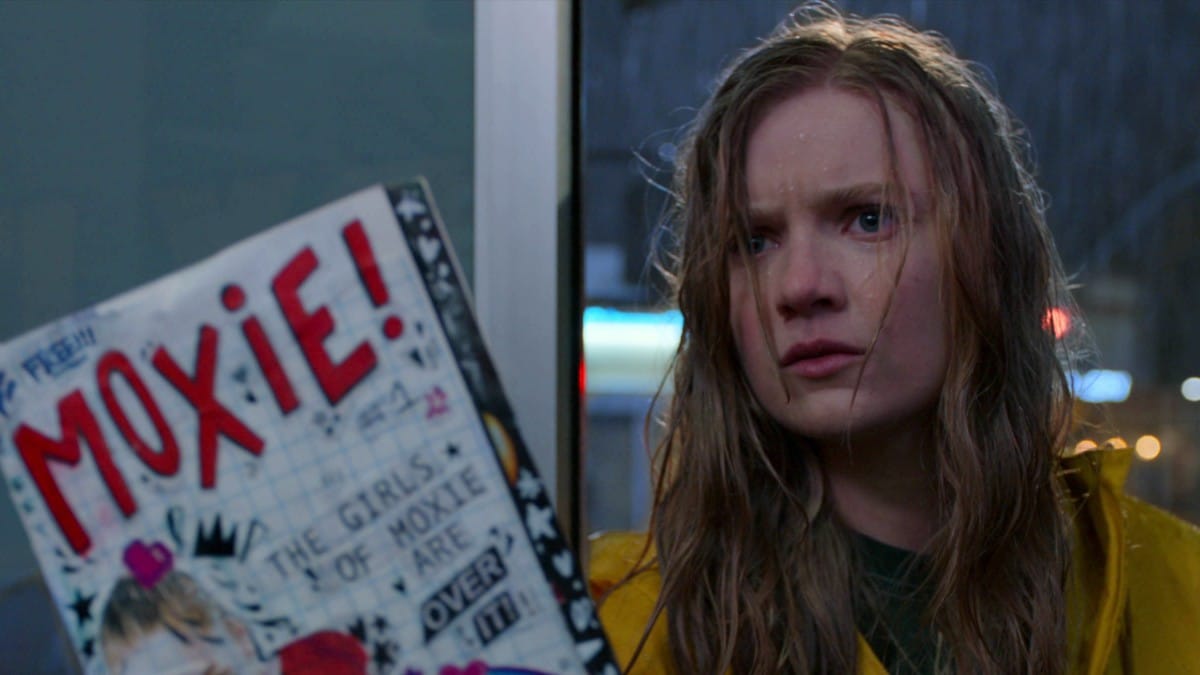
Premiering to Netflix on March 3 is the highly-anticipated flick Moxie. Directed by the queen of comedy herself, Amy Poehler, this movie will have all of its watchers cracking smiles and stifling their laughter as it digs into the topic of fourth-wave feminism.
Moxie tells the story of a teenage girl who has lost her voice. Young 16-year-old Vivan (Hadley Robinson) finds herself stumped when faced with a college admissions essay from UC Berkeley that asks her to discuss a cause that she feels passionate about.
Grade 11 is going to be a tough one
While at school, Vivan meets up with her seemingly-perfect best friend Claudia (Lauren Tsai) who shares her chosen essay topic and her bulleted list of subjects and experiences to write about. While these two happenings spark her newfound interest in identifying a social cause that she supports, Vivan also bears witness to the misogynistic behavior of the school’s beloved athlete Mitchell Wilson (Patrick Schwarzenegger)— who in actuality, is a total creep.
Vivan observes Wilson purposefully blocking the view of the new girl Lucy (Alycia Pascual-Pena), and then moments later, he talks over her in class when she argues against the relevancy of reading the Great Gatsby. Lucy challenges her English teacher and states that a more accurate and modern representation of the American Dream would be to push stories of immigrants and first-generation American citizens to the forefront.
Of course, beefhead Mitchell disagrees and does so rudely by cutting her off. Moments later, he plays up the “nice guy act” and offers to buy Lucy a soda which she refuses. He then takes the drink she already paid for and in an act of disrespect, he opens the drink and spits in it before handing it back to her.
Vivan sees this and confronts Lucy. Trying to reassure her, she tells her, “Just ignore him.” But unsatisfied, Lucy tells her, “Why should I ignore him?” and points out how abusive and harmful his behavior is. When Lucy escalates this problem to the school principal, Shelley (Marcia Gay Harden), she is ignored and encouraged to take up an extracurricular — “Why don’t you join the marching band?”
Breaking it down
Here’s the situation: While the tropes in this Moxie are overplayed and exaggerated, it doesn’t detract from the story whatsoever. From the get-go, Mitchell is this disgusting pig-of-a-man, and while it may seem “in your face,” it plays to the story quite well. As times have shown, to others, it may be enough to roll their eyes at this sort of behavior or excuse it as “well boys will be boys,” it often affects women — especially disenfranchised young women — more than it does other demographics.
In the case of Moxie, these tropes and situations are amplified in order to be fully understood by a general population.
Vivan’s final breaking point is when she bears witness to an annual list that is distributed by students schoolwide and ranks the school’s girls with childish and harmful superlatives. This list marks Lucy with a brand-new and extra mean superlative.
Vivan remains untargeted and under the radar, in an act of rage, she begins printing a zine called Moxie and distributing it anonymously.
Based on a novel by Jennifer Mathieu, this movie was reminiscent of the powerful 1990 cult-classic Pump up the Volume. But where that movie dived into dark, unspeakable topics and the stigma around these fights for social justice— Poehler and her team kept Moxie more light. Perhaps that’s a telling sign of the changing times. Topics that, at one time, would leave a person shunned and disgraced, can now be openly talked about and used as building steps to companionship.
This movie was expertly paced and arranged around a myriad of topics— it discussed the causal body-shaming demonstrated through strict enforcement of school dress codes and it even dabbled in the topic of familial neglect, heightened teen emotions, and sexual assault.
While many adult viewers have criticized the movie for not taking an extensive look into each of those categories, let it be remembered that the emotional state of teenagers is oftentimes fragile and sporadic, and their emotions aren’t always carefully arranged. So, when a character blurts out in a fit of rage that she’s hurt by her father’s absence in her life but doesn’t go into detail about it, perhaps it’s because she also has a million other things on her mind — much like Vivan.
All of the young actors in Moxie are ones to keep an eye on, there was not a single performance that seemed lacking or unsubstantial. They all banded together at the end of the movie to deliver an emotionally impactful scene, one that could bring tears to the eyes of even the most jaded adults. Lauren Tsai’s Claudia shined through the movie and she made it heartbreaking to watch as her quiet, introverted nature held her back from joining the rebellious forces of Moxie. However, the character still shows up, in more ways than none.
The adult actors also showed up! Poehler plays a brief but crucial role in this movie, Vivan’s mother who is super cool — but not in a “Regina George’s mom” way. And Marvel’s Clark Gregg has a supporting role as her new boyfriend. Ike Barinholtz (The Mindy Project) plays the English teacher in the movie and while it is terribly strange to see him play a role that’s not the resident funny-man, he effortlessly rocks this character.
Moxie was filled with palatable and very-healthy commentary on the current wave of modern feminism. It was beautifully diverse and had just the right amount of lovey-dovey content between friends and lovers. But through this, its message shone bright: This new generation is amped up and ready to end the reign of the “mediocre white dude’s chokehold on success.”
Moxie premieres on Netflix on March 3.